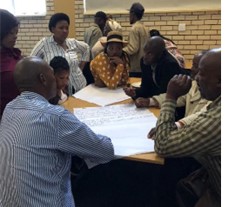 Marshall Institute Practitioner in Residence Emily Kasriel introduces her Deep Listening project
Marshall Institute Practitioner in Residence Emily Kasriel introduces her Deep Listening project
When people are listened to sensitively, they tend to listen to themselves with more care and to make clear exactly what they are feeling and thinking- Psychologist Carl Rogers
Most of us think we are above-average listeners. I come from the field of journalism, and journalists are especially confident in their ability to listen and find out what’s really going on and get under the skin of a story. However, often when we think we are listening we are actually distracted by the voices in our head. We may be thinking of the next question or deciding what to cook for dinner. And when we are listening to people we disagree with these inner distractions can get noisy as we judge what we are hearing while we rehearse counter-arguments.
The stakes are high. Good listening is vital to establishing a relationship of trust. Practising good listening is also critical in order to gain an authentic understanding of people from different perspectives in an array of fields, including philanthropy, social entrepreneurship as well as journalism. Listening is a foundational skill necessary to truly partner on any enterprise. However, we are often limited by our implicit assumptions and biases as we engage with representatives of communities we seek to serve or whose stories we try to tell. With a neutral or weak listener, the speaker may well respond with familiar pat responses, answers that they feel they are expected to deliver. Our inability to elicit more authentic and truthful narratives is especially challenging when the speaker and listener come from either side of fractious divides or from very different perspectives with an asymmetrical power dynamic.
During the last two years I’ve been leading the BBC Crossing Divides season, bringing people together in a fragmented world, on the hunt of how to bring those with conflicting ideas into a meaningful dialogue. In this quest I’ve been developing work on Deep Listening, drawing on my experience as an Executive Coach, training with conflict mediators, and being an expert speaker in an MA module on listening with the Hebrew University. I’ve spoken to psychologists, lawyers, organisational behaviour academics and facilitators such as Better Angels, all of whom are using a variant of Deep Listening. I’ve also trained over 200 members of the UK public in this skill at a BBC Crossing Divides Live Festival.

What is Deep Listening?
Deep Listening is both a framework and a process. When people use Deep Listening they listen in a fundamentally different way, ask more revealing questions and embrace more nuance. When a speaker feels they are being deeply heard they are more likely to convey an enriched narrative, reflecting not just their positions but what’s truly important to them, their motivations and their values. Research published in the Harvard Business Review indicates that when people feel truly heard they are more open to conflicting stories and diverse perspectives. They are also more likely to reframe their ideas and gain new insights into their own thoughts and ideas.
At its heart Deep Listening is about learning to be fully present and open to someone else’s story and world view as you listen, with curiosity but without judgement. It means listening not just to the words, but also to the emotions and what is expressed non-verbally. It involves capturing the essence of what you are hearing and checking that you’ve understood correctly. Deep Listening involves multiple skills: Being truly curious about what another person is saying, suspending judgement, enquiring, capturing the essence, acknowledging and validating. Also, importantly, the listener doesn’t need to agree with the speaker.
However, by listening deeply you are conveying the idea that, in the words of Psychologist Carl Rogers,:
I’m interested in you as a person, and I think that what you feel is important. I respect your thoughts, and even if I don’t agree with them, I know that they are valid for you. I feel sure that you have a contribution to make. I’m not trying to change you or evaluate you. I just want to understand you. I think you’re worth listening to, and I want you to know that I’m the kind of a person you can talk to.
I am excited to start my time as a Practitioner in Residence at The Marshall Institute. I will be reaching out to academics and practitioners who are already using variants of Deep Listening in their work in order to understand their impact. I plan to hold a workshop and engage with philanthropists and social entrepreneurs to apply these techniques. Then I will share best practices with students and the larger impact community.
If you are already using these techniques, or are interested in applying them in your work in the impact space, Emily would love to hear from you at E.Kasriel@lse.ac.uk






I could real anderstand your environment also we need more real life attitude your area. thank you so much